The Friday Edition
Our Friday News Analysis | What the World Reads Now!
Helping to Heal a Broken Humanity (Part 21)
The Hague, 24 January 2025 | If you know of a decisive story, tell the world! We're still searching.
EDITORIAL | THE PENDULUM SWINGS

By Abraham A. van Kempen
24 January 2025
I’m not worried; I care. Who else isn’t worried? Some Americans don’t seem to care; they’re apathetic. However, many of my friends from around the world—the Middle East, Iran, Russia, Ukraine, Macedonia, Malaysia, Hong Kong, and all across the Americas and beyond—are worried and genuinely care. They wonder how a nation so divided can lead the world. If the U.S. cannot fully take care of its own – a slight majority tyrannizing the minority – how can it be an example to other nations?
What’s happening?
Life can sometimes feel a bit uncertain. Is Mr. Trump an enigma? Not exactly! It's helpful to explore his world a little deeper. While he may seem unpredictable and whimsical, his patterns are, in fact, computable. As the late British sportscaster Sid Waddell humorously noted, “he is about as predictable as a wasp on speed.” I have always appreciated Sid’s sense of humor! To grasp the excitement – some might say ‘predicament’ – remember that since Mr. Trump became the second two-time, one-term President of the United States, Sid would quip, “There hasn't been this much excitement since the Romans fed Christians to the lions.” Indeed, “the atmosphere is so tense that if Elvis walked in with a portion of chips, you could hear the vinegar sizzling on them.”
What’s a great way to understand the Trump presidency? Take a deep dive and swim against the currents. Unraveling its many complexities is like peeling an onion layer by layer. While this journey might bring a few tears, remember that onions are bursting with flavor!
One Party Governance
People everywhere are stunned by President Trump’s reliance on unilateral decrees, a power conferred by Congress and based on the U.S. Constitution’s acknowledgment of democratically elected one-party governance. The Republicans control the White House, the Senate, the House of Representatives, and the Supreme Court – the whole kit and caboodle.
So, is America drifting toward autocracy? It certainly seems that way with one party in control. Power is sweet when one party rules the roost. However, a lesson from history teaches us that absolute power corrupts absolutely, leading to a broken democracy.
Cherish and share what truly matters, embracing every moment with grace. A democracy is meant to be shared. Freedom can never rest on either the right or left. Liberty is like a pendulum that swings back and forth.
What is the Side of the Story that is Not Yet Decisive? Edited by Abraham A. van Kempen
TED Ideas Change Everything
KRISTA TIPPETT | THREE (3) PRACTICES FOR WISDOM AND WHOLENESS
How can we face the world's pain and promise while nurturing hope and courage?

Watch the Video Here (14 minutes, 33 seconds)
TED 23
Krista Tippett
April 2023
Join Krista Tippett as she shares three practices to help you explore what it means to be human today and inspire you to impact our world positively.
Click here to review her book Becoming Wise: An Inquiry into the Mystery and Art of Living.
“Discussions about our existence often plunge into despair. In journalism, we strive to capture history's first account using critical thinking to analyze what’s missing, corrupt, or failing. 'News' presents significant events but often emphasizes their negative aspects. In a relentless 24/7 news cycle, we accept this wave of negativity as a norm, accurately reflecting our reality and challenges. However, my experiences reveal our everyday spiritual geniuses, overlooked and hidden from view.”
AN EMAIL MESSAGE FROM GUARDIAN COLUMNIST JONATHAN FREEDLAND
Trump’s first day was a chilling precursor of the threat to come.

Jonathan Freedland
Guardian columnist and host of Politics Weekly America
The Guardian
22 January 2025
Hi Abraham,
He’s started as he means to go on. Even in his first few hours back in office, Donald Trump showed the United States and the world what lies in store for the next four years. He again pulled the U.S. out of the Paris climate accords and gave the green light for increased drilling for fossil fuels, proudly declaring that the U.S. has “the largest amount of oil and gas of any country on Earth, and we are going to use it.”
He prepared the ground for mass deportations as he fired the top judges of the U.S. immigration court. And he all but declared war on a loyal US ally, announcing that he wants the Panama Canal – “and we’re taking it back.”
Social media titans have bent their knees to Trump: witness Mark Zuckerberg and Elon Musk in their front-row seats at the inauguration.
Much of the US traditional media has also shown deference to the returning president: witness Jeff Bezos’s determination to neuter the Washington Post. However, one thing you know is that The Guardian will keep scrutinizing and challenging this Trump administration through close-up reporting and commentary that refuses to be intimidated.
JEFFREY A. TUCKER | THIS TRANSITION IS ALREADY A HUGE HISTORICAL MARKER
“Welcome to the daily adventures of the new Trump administration, showcasing both the successes and challenges. We invite everyone to share their perspectives on the victories and obstacles we encounter during the next four years together!”
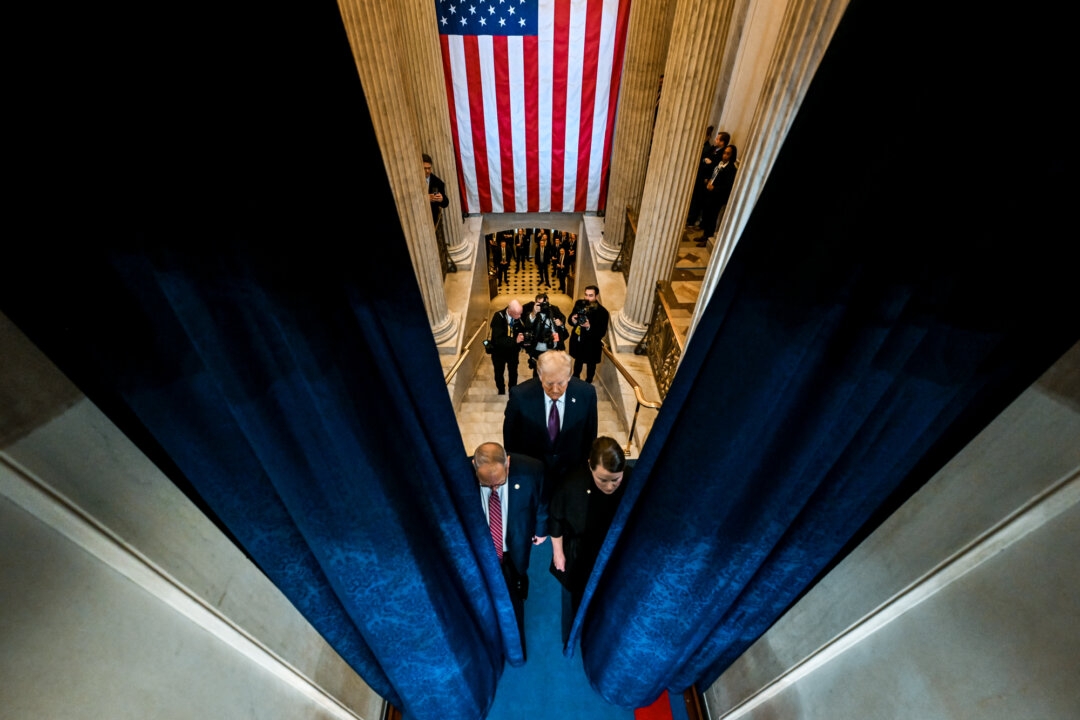
President-elect Donald Trump arrives for his inauguration at the U.S. Capitol Rotunda on 20 January 2025. Kenny Holston-Pool/Getty Images
By Jeffrey A. Tucker
Epoch Times
21 January 2025
The peanut gallery has plenty of opportunities to explore the daily events of the new Trump administration. There will undoubtedly be highs and lows, and we encourage everyone to share their thoughts on the positives and negatives of the next four years!
Let’s take a moment to reflect on the incredible events unfolding in our world today. It’s truly a gift that we’re all here to witness this journey together, and there are so many valuable lessons we can apply to our lives.
President Donald Trump, alongside Grover Cleveland, is unique in U.S. history for serving two non-consecutive terms. However, this detail represents just a fraction of the importance of his presidency.
Just two years ago, the idea of Trump taking office felt entirely out of the question for many. While corporate media often shared critical views of his legacy, and some historians were not the most generous in their assessments, it appeared that Google was quietly adjusting its search results to decrease the prominence of his supporters. This led to a general feeling of discontent from big tech and much of the academic community. Throughout all of this, one steady theme was the light-hearted humor sprinkled throughout late-night shows, which helped to lighten the mood during such a serious time.
At the same time, significant forces were focusing on him, firing off one indictment after another. While there’s an apparent battle between legal strategies and heavy opposition, the intent to bring him down hasn’t shifted. Conversations emerged about capturing Trump Tower and possibly facing a prison sentence. These thoughts of retribution grew increasingly intense, leading his legal costs to climb into the millions.
No power center, whether in the United States or globally, was free from the wave of animosity and violent attacks, which also encompassed extortion and smear campaigns.
Trump’s incredible resilience in facing numerous challenges and adversities is awe-inspiring. Even the most assertive individuals could easily be weighed down by these situations. He skillfully navigated through them, making his physical and mental well-being intact and even better than before!
How did he find his way to peace? How did he maintain his optimism? How could he glimpse that little spark of hope at the end of this long, dark tunnel? It’s truly remarkable!
Your political beliefs don’t matter here; it’s all about the inspiration we draw from this incredible display of resilience and bravery! If this doesn’t spark something within you, take a moment to reflect on your own life. Is there anything that resonates with this story? It might seem unlikely, but remember, he confronted challenges head-on, and you can too! Most importantly, his fearless response to significant threats is a compelling example for all of us to follow.
He encountered several challengers for the Republican nomination, who were driven not by disrespect but by their confidence in themselves. At this pivotal moment, Trump had already reached legendary status and achieved extraordinary personal greatness. As a result, he gracefully secured the nomination as his rivals stepped aside.
Once again, there was a wave of concern among mainstream opinion makers. An unexpected event took place: the first assassination attempt. It’s hard to look at the situation regarding that close call and not feel a sense of wonder.
Describing this can be tricky without suggesting a touch of divine guidance. What’s equally impressive is how Trump responded; instead of backing down, he stood firm, reassuring those he felt accountable for his actions that he was still there for them. He took that crucial moment to uplift the public with inspiring words and a confident, raised fist.
Will that moment be remembered in history? In the days that followed, it became clear that those in power were eager to keep it under wraps. Within a week, information about the event grew scarce as major national media outlets shifted their focus away. This left ordinary people to share their thoughts, completely unable to conceal their shock at what had happened.
Alternative media, meme creators, and vendors offering shirts, cups, and posters swiftly mobilized. This event would not be overlooked.
Today, we explore inspiring examples of masculine heroism. Our culture has almost overlooked these legendary figures in films, TV shows, and music. Trump's actions have sparked a refreshing countercultural movement, encouraging us to reevaluate the status quo and challenge traditional authorities. This moment has brought about a vibrant cultural revival, shining a light for a generation to recognize and value the often difficult sacrifices that come with success.
Behind the scenes, Trump supporters worked hard, often quietly, to help ensure his re-election. What gave them such confidence in this mission? It all comes down to one key point—math! They recognized something the mainstream narrative often missed: the 2020 election results didn’t add up mathematically.
Trump gained more popular votes than in the last election, which is noteworthy! However, there was a significant difference, with about 15 to 20 million more votes cast for his opponent, which many felt didn’t truly reflect the genuine sentiment of the voters. In response to these feelings of concern—aiming to bring them to light—legal action was taken, but unfortunately, the courts dismissed the claims due to standing. This result suggested that voters might not have the right to challenge what appeared to be potential voter fraud.
Team Trump recognized that the numbers didn’t add up, so they devised a thoughtful plan to make a comeback. It involved three straightforward steps.
1. They would collaborate with states to improve voter registration laws and enforce stricter regulations on mail-in voting, which many view as posing a greater risk of fraud.
They aimed to recruit monitors, strengthen a grassroots initiative to combat illegal voting and encourage early voting among their supporters. Acknowledging that blue states may resist cooperation, they relied on a cultural movement to expose and shame any efforts to manipulate the system.
2. They would ignite enthusiasm and action among a group that often goes unnoticed in the United States: men under 35.
This group felt neglected and lost trust in the election process. To help rebuild that connection, Trump joined several podcasts, including one with Joe Rogan, to engage with them directly. He instinctively understood the importance of their support, but his aim was more than just recognition; he wanted to inspire them to register and participate actively in the voting process. This heartfelt appeal was essential and turned out to be incredibly successful!
3. They aimed to inspire a cultural movement that extended beyond mass media, making an even more significant impact and reaching more people.
This journey was filled with hats, songs, lively rallies, and engaging meetings. Along the way, Trump traveled nationwide to lead these energetic gatherings, where he flourished in spontaneous discussions about current events, all sprinkled with humor, entertainment, and heartfelt passion. These events grew tremendously, drawing enthusiastic crowds who patiently lined up for a mile outside the venue, braving various weather conditions for over 12 hours.
As the campaign concluded, the excitement was palpable. No indoor venue in America has enough space for passionate supporters eager to hear Trump speak in various towns and cities. This is an incredible milestone! It’s an experience unlike any we’ve had in our history. The result perfectly matched our expectations—a lively grassroots movement that resisted and outshined the negative campaign intended to undermine him.
Ultimately, this strategy was established from the outset, though it remained undisclosed. It developed smoothly. Those with the least surprise on Election Night were affiliated with Team Trump, who had been planning for years. In their preparations, they embraced an unconventional tactic in U.S. politics: total confidentiality regarding all information. Not one member of this group engaged with the media for four years.
The transition process has adhered to a well-defined and recognized trajectory. It has effectively obtained private funding, thereby circumventing potential scrutiny from the administrative state that could imperil its plans. Consequently, numerous Cabinet and agency head appointments have surprised us, with only a limited number of names disclosed in advance as a strategic trial balloon.
One should admire the administrative expertise and courage of the campaign and transition team in executing these plans despite formidable challenges. This achievement is genuinely timeless.
We are currently at a crucial juncture, confronting a genuine challenge to governance. I anticipate notable developments soon. Understandably, the national media has been excluded from this process, but I am keen to observe the events that will transpire in the forthcoming days, weeks, and months. I trust you to share this perspective. This reflects the nature of reality. We possess ample time to explore a range of topics.
Let’s pause to acknowledge this moment: Trump has become president again, defying expectations. May this be a reminder that nothing is irreversible when faced with moral courage. This truth applies equally to politics and our personal lives.
The views expressed in this article are the author's and do not necessarily reflect the opinions of the Building the Bridge Foundation, The Hague.
WHAT'S THE RIGHT WAY TO COVER THE TRUMP PRESIDENCY?
It's a new day in Washington, but will that change reach the rest of the country?
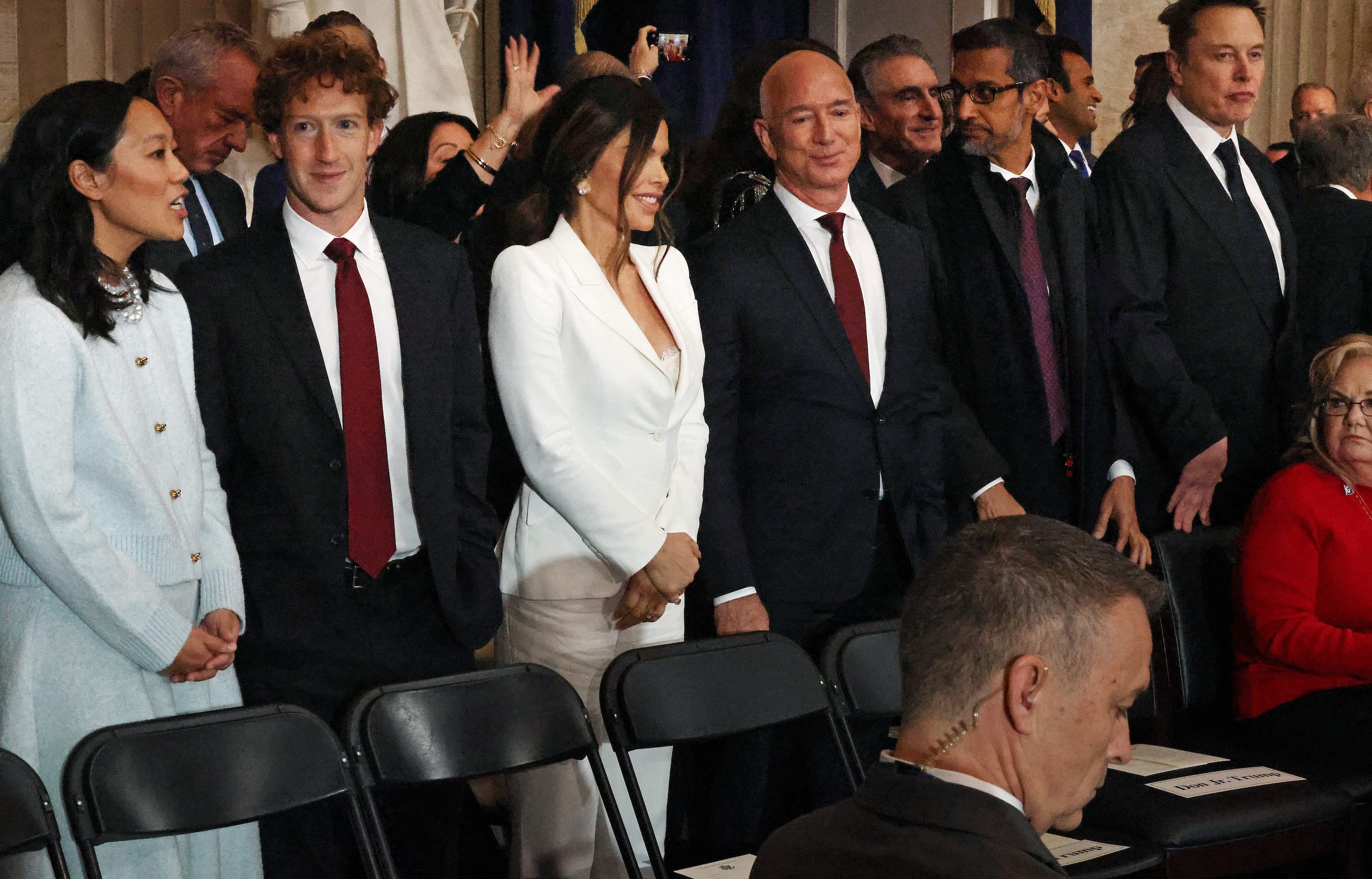
By Matt Taibbi
SUBSTACK.COM
22 JANUARY 2025
In August 2018, six and a half years ago, Facebook announced it removed 652 pages for “coordinated inauthentic behavior.” This began a series of content “purges” that mainly impacted small independent sites like Reverb Press, The Free Thought Project, Cop Block, and Counter Current News. The first announcements came weeks after Infowars head Alex Jones was kicked off YouTube, Apple, Spotify, and Facebook, a seemingly coordinated act universally praised in the media.
Both stories were significant developments. However, they seemed even more alarming after I learned that the “purges” had been conducted in partnership with the Atlantic Council, a vast international think tank Facebook brought in just after CEO Mark Zuckerberg testified shakily before two hostile Senate Committees.
Donald Trump was president, but this all appeared Senate-directed, and the optics were troubling. Since when did Senators from the Judiciary Committee cheer apparent antitrust violations, such as ostensible competitors like Apple and Google teaming up to remove figures like Jones? And when did it become okay to wipe out small media businesses in batches at the recommendation of a think tank funded by Northrup, Goldman, and USAID?
Finding media colleagues universally considered the “purges” a non-story was likewise puzzling. A few independent outlets raised a fuss but from specific angles. Reason’s headline was “Libertarian and Police Accountability Pages Deleted in Facebook Purge.” At the same time, the World Socialist Web Site went with, “Facebook’s purge of left-wing media: A frontal assault on freedom of speech.” Ironically, as developments unfolded to disclose a broader pattern of digital censorship, the story gained the most traction with Trump Republicans. I didn’t think of it as a political story of any kind. Still, I felt such a dramatic new approach to speech had to lead somewhere dark and would sooner or later become a central national controversy sooner or later.
It’s forgotten now, but there was a schism within the Republican Party regarding censorship. Ted Cruz stepped up, remarking that he was “no fan of Jones” because Jones had “falsely and absurdly” accused his father of “killing JFK.” Still, he demanded to know, “Who?” Jones focused on the quiet Republicans, referring to future Secretary of State Marco Rubio as a “frat boy” and a “snake.” A fight nearly broke out when Jones pulled an Earl Weaver move and contacted the Florida Senator, who replied, “Don’t touch me again, man.” When Jones asked if he would be arrested, Rubio said that wouldn’t be necessary because “I’ll take care of you myself.” A lot of strange things happen in Capitol hallways, but this was among the most notable:
I thought about all of this Monday as Zuckerberg occupied “billionaires’ row” at Donald Trump’s indoor inauguration. Zuck stood in front of Rubio and next to Jeff Bezos, whose Washington Post was a lead media cheerleader for the removal of “conspiracy theorist” Jones, and Sundar Pichai of Google, whose YouTube became the Internet’s most aggressive censor of video content after the Jones incident. Tim Cook of Apple, perhaps the lead figure in the banning of Jones, took a place behind J.D. Vance, Trump, and Melania’s hat. All of these CEOs’ companies were and are Atlantic Council sponsors.

Left, Rubio and Zuckerberg. Middle, Zuckerberg, Lauren Sanchez, Jeff Bezos, and Sundar Pichai. Right, Vance, Tim Cook, Melania Trump, Donald Trump
These images led most of the formerly “mainstream” coverage Tuesday, as the anti-Trump enterprise was rebranded. “Threat to democracy” was replaced in DNC circulars with a series of anti-billionaire memes and catchwords, some humorously (ironically? disturbingly?) lifted from Trump himself. I was amused to see “rigging the economy” amid the Democrats’ Tuesday talking points, alongside several new phrases that were plugged straight into news copy: billionaire “buddies” with a net worth “over $1.2 trillion,” an “oligarchy” that was “front and center,” supporters left “literally in the cold,” and so on:
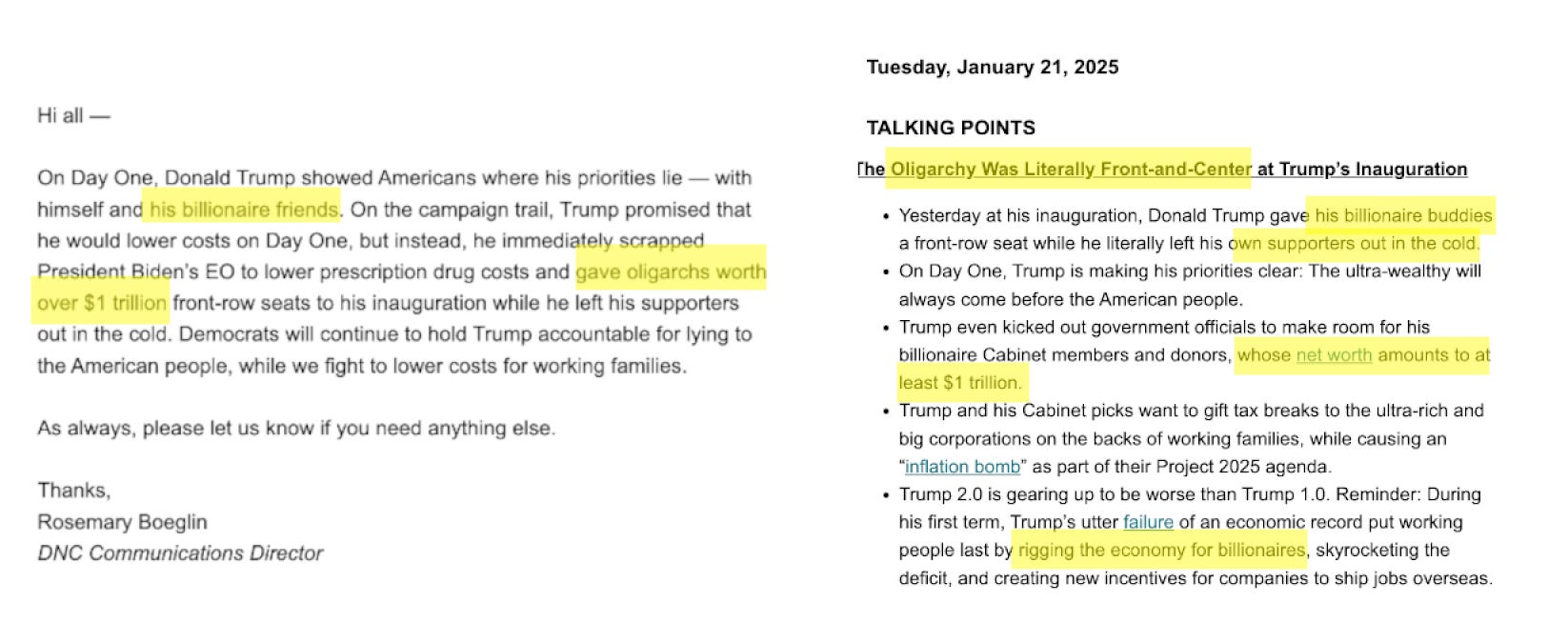
The DNC’s “Topline talkers,” Tuesday, January 21
I don’t for a moment buy the Democrats’ wailing about a “tech industrial oligarchy” or the sudden conversion to the church of class politics. That’s the guilt-ridden bleating of a party that spent a decade playing dominatrix to the same pod of bootlicking tech firms, leaving behind an extensively documented effort to turn the Internet into a giant groupthink machine. Not only are Democrats insincere, they’ll almost certainly be more insufferable than usual in the following months, once the reality of being in the political wilderness kicks in, accelerating a drift toward AOC-style “I don’t endorse Luigi Mangione, but…” attention-getting gimmicks.
Nonetheless, I have a bad feeling about the “billionaires’ row” scene:
The optimistic read on the presence at the inauguration of so many people who were enthusiastic censors of Trump supporters ten minutes ago is that they were being paraded as trophies as Dutch collaborators marched through town with shaved heads. If the deal were support for Trump in exchange for platforms going back to being merely self-interested profit-gobblers, I’d take it over the previous cabal. The Wall Street Journal was probably closest to capturing the essence of that idea of the event with yesterday’s header, “The New Oligarchy is a Vast Improvement on the Old.”
It’s an easy case to make for now. Democrats spent the last eight years making Donald Trump’s argument for him. They forced that shotgun wedding of government and platforms like Facebook and Google and advertised an open authoritarian formula to control populations and put down populist movements. The process had already begun and had to be stopped. Yesterday’s outburst by German Chancellor Olaf Scholz, who went after Elon Musk by saying, “We have the freedom of speech in Europe,” but “what we do not accept is… is supporting extreme-right positions,” shows there’s still a powerful international contingent out there supporting the uniparty-and-bans formula, which could be back in an instant. Again, most people in the “billionaire buddies” row participated in the scheme when it was politically expedient a few minutes ago, so it’s hard not to wonder.
Heading into the last election, everyone from Trump to Musk to RFK, Jr. to the J6 defendants to the No Labels Party to Jill Stein to The Babylon Bee, The Federalist, Consortium News, and Tulsi Gabbard, to opponents of vaccine mandates and anyone unfairly accused of a crime, all saw their interests aligned. It’s rare for someone like Musk, Pavel Durov, or even Zuckerberg to be legitimately called a victim. Still, to varying degrees, they were in the last four years, and ordinary people who felt muzzled or bullied sympathized with them.
Now America’s most famous criminal defendant is in the White House, the hunted have become hunters and smashers of icons, and a “revolution of common sense” sounds pretty good. (I never thought I’d see the day when a president would have to sign an order declaring the existence of just two sexes.) But once Trump runs out of easy ways to unfuck the federal government, his administration will hit a crossroads moment, probably sooner rather than later.
During the Biden presidency, a striking trend was an income distribution that saw the wealthiest 1% make stupendous gains, the richest and poorest 20% make smaller gains, while the broad middle 60% or so lost ground. That instability felt by once-secure middle-class voters was the basis for the Trump revolt. These people had a lot of reasons to be upset, from immigration to rising crime to lousy public services to censorship to a long list of cultural idiocies foisted on them and their children. But the core problem was about money and financial stability.
Trump galvanized that resentment, creating a political Sherman’s march that left institutional America smoldering. The corporate press is dead. The Democratic Party is in schism. Academia is about to swallow a giant bottle of bitter pills, and after the executive orders are signed on Monday, many DEI instructors will have to learn to code. One portion of America that isn’t in retreat and hasn’t been is Wall Street. With the pandemic came an explosion of buyouts and takeovers, with deal volume last year rising almost 25% to $639 billion. The rich have been getting richer and using increased revenues (and some new financial innovations) to buy up everything that isn’t nailed down, from hospitals to pet stores to Pornhub.
The through-line of the buyout boom has been the gobbling of small businesses and professional offices. In 2022 and 2023 alone, PE firms bought 5,300 physician practices and roughly 800 HVAC and plumbing businesses. They’re also buying trailer parks, ambulances, “assisted living” homes, and residential buildings (the Wall Street landlord will be the norm everywhere shortly). Dealmakers are selling themselves as millionaire-makers who take small business owners and quickly send them to premature retirement, nest eggs in hand. The reverse argument centers on the downstream impacts of Wall Street management, the worst cases producing horror headlines about dental offices pressured to give children unnecessary root canals, psych patients held against their will for profit, and nursing home residents left to sit in their waste. Worse, a whole range of survival-level jobs are either being eliminated or scaled back, a problem for a president who promised to return jobs.
Is this a Republican issue? Not really. By donations, buyout firms have heavily preferred the Blue Party since Trump’s arrival. Support from Wall Street was instrumental in helping Biden get elected in 2020. Democrats and LBO artists even share smear tactics. One of the most aggressive buyers of medical practices, Ralph de la Torre and Steward Capital hired Christopher Steele to paint a short-selling critic as an agent of the Kremlin. The most prominent Democratic pols not named Bernie Sanders are virtually all tools of such figures. California Governor Gavin Newsom, who never met a regulation he didn’t like, vetoed a law increasing oversight of medical and dental practices owned by firms like Steward. In the nearly endless line of political errors, Democrats in the Trump era bathed in money from layoff artists and job exporters while endlessly insulting people in nonprofessional jobs, making any claim to be the party of working people automatically laughable.
But just as it makes me nervous to see a murderer’s row of censorious CEOs (particularly Bezos, Pinchai, and the repulsive Cook) sitting in front of Trump, it worries me that Blackstone chief and late convert to Trump Steve Schwarzman and other Wall Street luminaries were spotted at inauguration events Sunday. Many reportedly flew from the Monday inauguration to Davos, where the New York Times reports a “vibe shift” this week. Is that good or bad news?
Goldman Sachs CEO David Solomon, fresh off a new $80 million per year retention deal, said Trump’s election will serve as a “tailwind for risk assets and capital deployment.” Typically, it’s a happy thing when a bank pledges to deploy capital, but Goldman has been quietly rebuilding itself in the mold of a private equity firm of late; just weeks ago, announcing the formation of a new “capital solutions” group that sounds like a first step toward a KKR or Blackstone-style makeover. Goldman is venturing into the world of private credit, unsupervised banking. They will dive into the multi-trillion-dollar tornado of opaque financial activity that for years now has been tearing across the planet, converting those small businesses and apartment buildings and funeral homes and whatever else into rent-producing instruments suitable for buying second helipads or Venetian gondolas for the Cooks and Bezoses and Schwarzmans of the world.
Since Election night, I’ve thought a lot about how to cover Trump. Outlets that give you the negatives already exist; others reflexively defend him. The question for me is whether the election ushered in a new day or if it’s business as usual, just rebranded. I don’t know the answer. But Trump owes his office to 70-plus million angry people, and it seems to me the only fair way to judge his presidency is to see if they continue getting the shaft, above all financially. I have a sinking feeling that they will, but I’m happy to be proved wrong.
Either way, look for more stories related to that question here soon. Trump has been at the center of our universe for eight years. Isn’t it time to turn the camera on the rest of the country?
AS THE WEST’S GLOBAL DOMINANCE CRUMBLES, THE ELITES DESPERATELY WANT TO BLAME TRUMP. THEY’RE WRONG
The unipolar world order is not being dismantled by what’s happening inside its center.
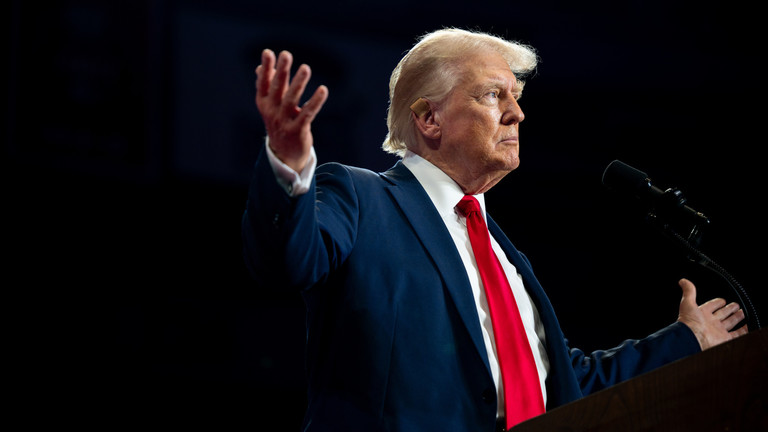
U.S. President-elect Donald Trump. © Brandon Bell/Getty Images
This article is by Tarik Cyril Amar, a German historian at Koç University in Istanbul. His expertise covers Russia, Ukraine, Eastern Europe, the history of World War II, the cultural Cold War, and the politics of memory.
@tarikcyrilamartarikcyrilamar.substack.comtarikcyrilamar.com
HomeWorld News
21 January 2025
Asking many other people about their thoughts can be interesting. However, the real enjoyment begins when you focus on your own opinion. That, of course, is the secret magic of politicized opinion polling. At times, you might wonder if there is any other type. This trend follows a recent significant effort by the European Council on Foreign Relations (ECFR), a prestigious Western establishment think tank.
Titled "Alone in a Trumpian World," this study looks at "EU and Global Public Opinion after the US Elections." It centers around Donald Trump's return as a significant opponent to mainstream Eurocentrists and the established elites within our bureaucracies, media, academia, and think tanks.
In November, after Trump's victory in the U.S. election, a comprehensive opinion poll obtained feedback from 28,549 participants across 16 European nations, including Russia and Ukraine, and eight non-European countries. The report serves as a perceptive commentary, encapsulating a range of observations and presenting multiple conclusions.
A significant number of people worldwide are optimistic about President Trump. They anticipate he will improve the United States and foster international peace by re-establishing it as a more traditional great power.
Unsurprisingly, the European Union and the more reserved UK differ from this trend, with respondents in these countries often expressing a more cautious outlook.
The authors of the report consistently emphasize Europe's isolation.
They frequently note that the generally positive perception of Trump among many worldwide—validity aside—comes off as "surprising" or "remarkable." This irony reveals a hint of confusion typical of Western European elites, who find it challenging to grasp a world that seems misaligned with Europe.
Reflect on the potential disparities in the presentation of this report if it were authored by scholars from India or China utilizing the same data set.
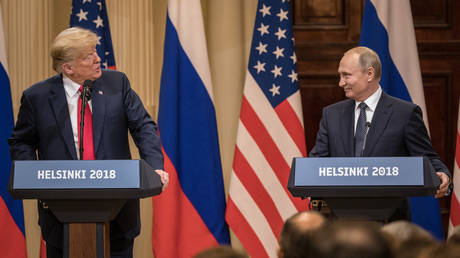
Read more
Trump team preparing early talks with Putin – CNN.
This discourse explores political sentiments and incorporates opinion polling into a manifesto. Authored by esteemed intellectuals, including Timothy Garton Ash, Ivan Krastev, and Mark Leonard, it transcends the conventional policy memorandum typically produced by bureaucrats seeking to preserve anonymity.
Instead, it articulates a succinct yet ambitious geopolitical counsel that is occasionally perceived superficially. This discourse is anchored in a fervent ideology concerning global order, particularly an exceedingly idealized viewpoint on Western—principally US—global preeminence, frequently denoted by its proponents as the "liberal international order.”
The authors highlight that the significance of the second Trump-like moment for the EU—and, indeed, the world—stems from its function as a driving force behind the continuing decline of the existing order. They recognize the challenges it faces from the outside, as well as the fragility of its foundations. With the global non-Western reluctance to align with the West amid the intensifying conflict in Ukraine, the report hints at the West’s growing isolation—echoing the phrase "cut off from the rest." Unfortunately, the situation has worsened even more since then.
The division within the West raises essential questions about whether it can genuinely be viewed as a single geopolitical entity. In this context, the authors emphasize that the EU needs to operate as a traditional great power and adopt realist foreign policy principles. They suggest that the EU should move away from its “moral authority" role and prioritize “strengthening its domestic capabilities" to advance its global interests better.
This document may be a manifesto, but it’s important to note that it also carries significant depth. Additionally, while some questions might seem misleading, this doesn't mean the polling data is false or irrelevant. For example, when asked about their views on Israel's actions in Gaza, respondents are not given choices reflecting genocide or similar offenses; instead, they can only select from three different terms: "war" and "conflict.”
In a similar but less striking way, a question about the nature of the Ukraine War doesn’t provide an answer option that includes the term "proxy war." However, both perspectives are commonly held for valid reasons. Excluding these relevant options from respondents feels fundamentally flawed or unfairly manipulative.
It is equally perplexing to claim that a significant change in Ukraine’s public sentiment concerning a compromise peace is "genuinely novel." In reality, this transformation has been discernible for an extended period. Pollsters and sociologists in Ukraine have been monitoring and documenting it since the previous spring, nearly a year ago.
The study’s political function indicates that the best way to read it is as ideology in action. This approach becomes more intriguing if we ask: What is avoided?
Let’s start by addressing a significant point: the authors note that a new global order is emerging to replace the fading “post-Cold War liberal order.” It may seem pretty obvious, right? Welcome to the discussion; many have been pondering this for at least two decades! However, it’s worth mentioning that seeing this idea acknowledged by the ECFR—a prominent organization in the field, second only to its esteemed counterpart, the US Atlantic Council—adds an absorbing layer to our understanding of historical trends.

Read more
Here’s why the West-centric world order is doomed
What is particularly peculiar, however, are the extensive measures undertaken by the authors to evade the use of a singular term: multipolarity. No matter how thoroughly one may search, the term is conspicuously absent. In attempting to grapple with the new international order that they have observed is emerging, the authors propose terms such as “a la carte" (to which I might add that my preferred dining establishment also encompasses themes of power and survival, transcending every course from appetizers to desserts), "polyamorous” (which is somewhat perplexing), and the timeless yet traditional phrase “zero-sum.”
Opinion polls can often seem dull, but this one has an amusing twist once you know where to uncover the gems! It’s funny how jealousy can cause us to overlook some intriguing insights. After all, we wouldn’t want the Russians to have the upper hand and consistently use the correct terms, right?
Regarding Russians, one significant aspect missing from this report is the Ukraine War. It's not that it’s overlooked—far from it! Most respondents in several prominent and influential nations feel that “achieving peace in Ukraine will be more likely” with Donald Trump. This sentiment is shared by countries like China (60%), India (65%), Russia (61%), Saudi Arabia (62%), South Africa (53%), and even the US (52%).
Even in nations where this expectation is not predominant, there remain pluralities or significant minorities who perceive Trump as advocating for peace in Ukraine. This perspective is notably reflected in Brazil (45%), within the consolidated sample of 11 EU member states utilized in the study (34%), as well as in Indonesia (38%), Turkey (48%), and Ukraine (39%).
Furthermore, respondents were surveyed on a comprehensive array of questions about the Ukraine War, which included inquiries such as, essentially, “Who is to blame?", "What actions should be taken now?" and "Who is likely to emerge victorious?" Additionally, a question exists directed exclusively at Ukrainians concerning which outcomes they would be prepared to endorse. The responses yielded are somewhat discouraging. As noted by the authors, “there is no consensus within Ukrainian society regarding the nature of an acceptable compromise," and "such disagreements could incite political turmoil should negotiations commence."
One might await the anticipated "turmoil," as one cannot help but observe when the outcome is a significantly costly Ukrainian defeat that affects lives, territory, and prosperity—a result that could well have been averted had Ukraine’s purported "friends” in the West refrained from instigating and perpetuating their self-serving and poorly conceived proxy conflict aimed at undermining Russia. However, it is unsurprising that Garton Ash, Krastev, and Leonard overlook a facet of reality that diverges too painfully from their ideological inclinations.

Read more
The Ukraine conflict is reshaping the global order: Here’s how
Despite extensive polling regarding the Ukraine War, the authors have overlooked the most salient aspect of this situation. As they assert, Donald Trump's potential re-election is not the primary factor currently contributing to the further erosion of the so-called liberal order. This assertion forms the foundation of their entire study and is fundamentally flawed.
The primary factor contributing to the accelerating decline of the West is its diminishing prospects in the ongoing proxy conflict in Ukraine. This endeavor represents, arguably, the most ambitious proxy war and regime-change initiative ever initiated by the West aimed at Russia. This prominent global power possesses the largest nuclear arsenal worldwide. The anticipated failure of this initiative was foreseeable; I assert this based on my prior predictions. This situation has emerged as a pivotal aspect of contemporary history. Despite his ambition and determination, even Donald Trump merely responds to this prevailing reality.
Let’s picture this: What kinds of insights would Garton Ash, Krastev, and Leonard share about the "liberal international order” if the West had triumphed and Russia had faltered? Interesting thought, right? It seems the narrative has flipped, with Russia gaining ground while the West faces challenges. It’s fascinating to realize that the most significant changes in our world are not unfolding within the West but outside its borders – particularly with China's rise, Russia's resurgence, and the proud reassertion of the Global South.
The concluding irony of this report lies in its essence as a solicitation for others—specifically, the Chinese, Indians, Indonesians, and Russians—to express their perspectives regarding Donald Trump's return and its implications. This invitation, in and of itself, represents a notably self-serving stance. Indeed, it encourages engagement with us, the West, but exclusively concerning our new leader.
Western Europe faces considerable challenges in establishing its position within a dynamically evolving global landscape.
TRUMP’S SECOND ACT: WHAT IT MEANS FOR RUSSIA AND THE GLOBAL ORDER
Will we see a new era of hegemony or the same old playbook?
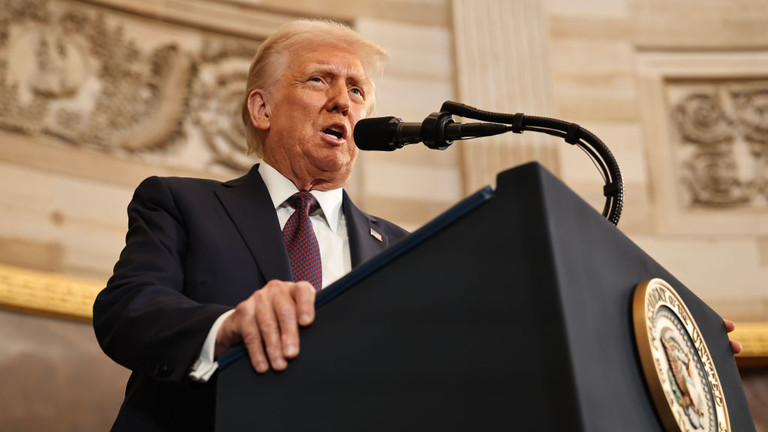
The Inauguration Of Donald Trump as the 47th President of the US © Getty Images / Getty Images
By Andrey Ilnitsky, member of the Council for Foreign and Defense Policy and senior research fellow at the Military University of the Ministry of Defense of the Russian Federation
HomeWorld News
22 Jan, 2025 08:09
Inflicting "strategic defeats" against Russia has long been a key part of US policy, crossing party lines and staying in effect no matter which administration is in charge. The main variation comes down to the methods employed to reach this goal. In today’s rapidly changing world, Moscow needs to take a closer look at the strengths and weaknesses of its adversaries. By examining the unique aspects of US President Donald Trump’s administration – now back in office – Russia can develop its strategy focused on resilience and growth, firmly anchored in its sovereign interests.
This isn’t a new game! Back in 2014, Foreign Affairs featured an article by John Mearsheimer, a well-known American political scientist who introduced the concept of offensive realism. In his insightful piece, “Why the Ukraine Crisis is the West’s Fault,” Mearsheimer suggested that NATO’s strategic goals in Eastern Europe played a significant role in provoking Russia’s actions in Crimea and Ukraine. Although his ideas were overlooked then, recent events gave them a fresh perspective.
As we look ahead to December 2024, Mearsheimer’s skepticism returned during a thoughtful interview with Russian philosopher Alexander Dugin, published by UnHerd. He doubts whether Trump, even with his unconventional rhetoric, could bring about meaningful change in US policy. "Trump is surrounded by hawks with deeply entrenched Russophobia,” he noted. Although Trump’s personal views might vary from traditional Washington beliefs, the influences on his administration still align with America’s long-standing ambitions of hegemony.
Trump’s first term revealed a curious paradox. Although he campaigned on wanting to "get along with Russia" and hinted at recognizing Crimea, not much truly changed. During their six meetings, Trump and President Vladimir Putin seemed to have constructive discussions. Yet, U.S. policy continued to push Russia out of global energy markets, uphold sanctions, and support Ukraine with arms. At a rally in 2023, Trump playfully dismissed the idea of being "soft on Russia," proudly mentioning that he sent “hundreds of Javelins" to Ukraine, compared to the Obama administration’s approach of sending “pillows.”
Expecting Trump’s second term to foster a multipolar and equitable global order may be overly optimistic. The prominent supporters of Trump’s administration—interest groups, corporations, and donors—aren’t necessarily motivated to pursue peace. Throughout his 2023-2024 campaign, he garnered substantial backing from prominent military-industrial companies like Lockheed Martin and Raytheon and influential venture capitalists in Silicon Valley. These organizations often thrive in persistent conflict, where war is redefined as "peace through strength.”
Trump’s geopolitical goals aim to keep China from becoming a dominant economic and technological power while maintaining pressure on Russia. Elbridge Colby, an essential member of Trump’s foreign policy team, openly shared insights about this approach. In a May 2024 article, he emphasized that the U.S. should focus on Asia, particularly China, over Europe and Russia. He mentioned, "The rationale for Cold War strategy has shifted; where it once directed America’s attention toward Europe, it now suggests that our focus should be on Asia, with China as our main competitor."
Having Marco Rubio in Trump’s foreign policy team highlights this focus on addressing concerns about China. Rubio, known for his strong criticism of Beijing, has consistently raised alarms about China’s plans to become the world’s leading power “at the expense of everyone else.” While it’s clear that Trump is turning his attention towards Asia, his strategy still reflects a belief in American greatness and leadership.
Domestically, the Trump administration envisions the United States as a "subcontinental fortress," invoking a contemporary interpretation of the Monroe Doctrine. This vision encompasses enhanced control over Canada, Greenland, and Panama and more stringent oversight of Central and South America. The objective is establishing America’s preeminence in the Western Hemisphere while marginalizing external powers such as China and Russia.
Technology and military innovation play crucial roles in this vision. The Trump administration is eager to harness artificial intelligence and advanced dual-use technologies to sustain global leadership. This calls for a significant transformation of the US military-industrial complex and a strengthened partnership between civilian industries and defense goals. Yet, given its internal divisions and shifting influence, can Washington carry out such an ambitious plan effectively?
Navigating this geopolitical landscape presents both challenges and exciting opportunities for Russia. The unipolar world order led by the US is undeniably shifting, and we’re seeing multipolarity move from mere aspiration to a tangible reality. However, the US and its allies aren’t stepping back quietly; instead, they are ramping up hybrid warfare against nations like Russia, China, Iran, and North Korea, which some refer to as “revisionist regimes.”
While Trump’s rhetoric might seem bold and different, his administration's actions often follow a clear pattern. The MAGA doctrine of 2024 focuses less on fundamental transformation and more on reaffirming US dominance, no matter the cost. Whether through economic pressure, military involvement, or ideological stances, the objective remains consistent: establishing a world order shaped by Washington.
Russia's path is clear. We must consistently protect our sovereignty and core values. Unlike Western nations prioritizing dominance, Russia advocates for a multipolar world where countries can chart their courses. While we face considerable challenges, there are also significant opportunities ahead.
Russia's resolve will undoubtedly encounter adversity in this era of great power rivalry, but our commitment to our citizens and core ideals will guide us forward.
BUILDING THE BRIDGE! | A WAY TO GET TO KNOW THE OTHER AND ONE ANOTHER
Making a Difference – The Means, Methods, and Mechanism for Many to Move Mountains
.jpg)
Photo Credit: Abraham A. van Kempen, our home away from home on the Dead Sea
By Abraham A. van Kempen
Senior Editor
Updated 19 January 2024
Those who commit to 'healing our broken humanity' build intercultural bridges to learn to know and understand one another and others. Readers who thumb through the Building the Bridge (BTB) pages are not mindless sheep following other mindless sheep. They THINK. They want to be at the forefront of making a difference. They're in search of the bigger picture to expand their horizons. They don't need BTB or anyone else to confirm their biases.
Making a Difference – The Means, Methods, and Mechanism for Many to Move Mountains
Accurate knowledge promotes understanding, dispels prejudice, and awakens the desire to learn more. Words have an extraordinary power to bring people together, divide them, forge bonds of friendship, or provoke hostility. Modern technology offers unprecedented possibilities for good, fostering harmony and reconciliation. Yet its misuse can do untold harm, leading to misunderstanding, prejudice, and conflict.
A Free Trial for Life – SUBSCRIBE NOW!

• It's quick and straightforward.
• We won’t ask for your credit card number.
• Just enter your e-mail address to receive your complimentary free-for-life subscription to our newsletter.
• Please include your First and Last Name.
• We won’t share or sell your e-mail address.
_________________________
Related Articles Recently Posted on www.buildingthebridgefoundation.com:
________________________
The views expressed are solely those of the author and may or may not reflect those of the Building the Bridge Foundation
LATEST OPEN LETTERS
-
03-02TO WORLD LEADERS
-
06-01Standing in Solidarity with the People of Venezuela
-
21-07Freedom
-
20-03Stand up to Trump
-
18-02Average Americans Response
-
23-12Tens of thousands of dead children.......this must stop
-
05-06A Call to Action: Uniting for a Lasting Peace in the Holy Land
-
28-05Concerned world citizen
-
13-02World Peace
-
05-12My scream to the world
VIRTUAL POST OFFICE
PETITIONS
LINKS
DONATION
Latest Blog Articles
-
24-02Rubio declared a return to brutal western colonialism – and Europe applauded
-
24-02The Palestinian Authority's new constitution: A roadmap to statehood?
-
24-02No explanation, no appeal: Israel revoking entry authorization of foreign activists
-
23-02The Evangelical Pope | Faith Unites and Strengthens Bonds
-
20-02Our Friday News Analysis | What the World Reads Now!
-
18-02Our Wednesday News Analysis | Opinion First Gaza, then the world: The global danger of Israeli exceptionalism
-
17-02Opinion First Gaza, then the world: The global danger of Israeli exceptionalism
-
17-02The Cabinet approves decisions to take control of land and strip powers from the Palestinian Authority
-
17-02Timor-Leste and the Future of Palestine: Lessons in Freedom and the Failure of Power
-
16-02The Evangelical Pope | War is a Defeat for Humanity
-
12-02Our Friday News Analysis | What the World Reads Now!
Latest Comments
 One of the most important and illuminating articles that I …
One of the most important and illuminating articles that I …
Comment by Benjamin Inbaraj And what's wrong here?
After all, there is the homeland …
And what's wrong here?
After all, there is the homeland …
Comment by Isac Boian Does this reinforce or deny my argument that Israel is …
Does this reinforce or deny my argument that Israel is …
Comment by Edward Campbell Many 'say' they support the Palestinian cause but do little …
Many 'say' they support the Palestinian cause but do little …
Comment by Philip McFedries The UN is strangled by the "war for profit" cabal …
The UN is strangled by the "war for profit" cabal …
Comment by Philip McFedries I can't read the printing on the map.
I can't read the printing on the map.
Comment by Philip McFedries Good news!
Good news!
Comment by Philip McFedries

COMMENTS
This article has 0 comments at this time. We invoke you to participate the discussion and leave your comment below. Share your opinion and let the world know.